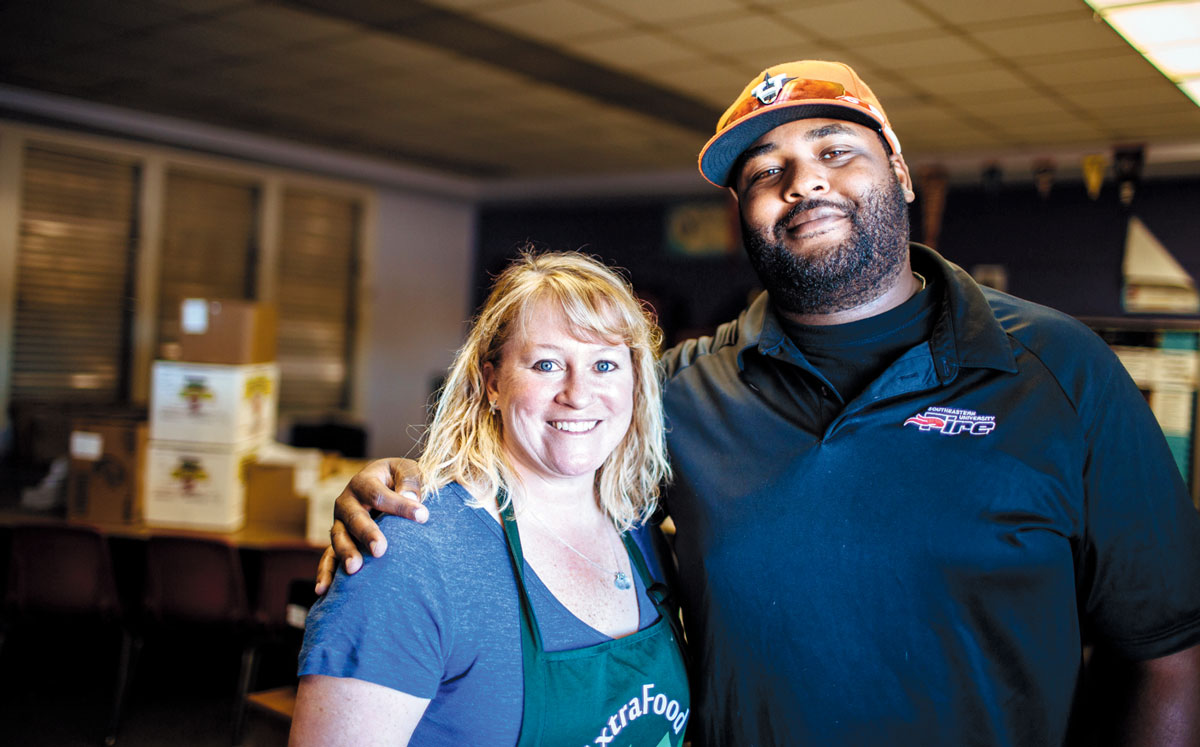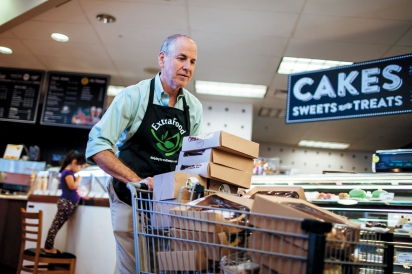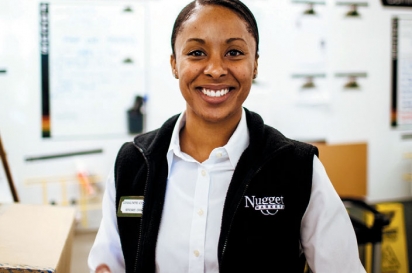ExtraFood.Org Tackles Food Waste and Hunger with Technology and Love
Sometimes the problem is the solution. Marv Zauderer, the founder of ExtraFood.org, arrived at this conclusion as he thought hard about how to solve two pressing issues in Marin County, where he makes his home. First, he asked himself, why do 40,000 Marin residents struggle with hunger in a community so seemingly abundant it has been ranked as the healthiest county in California? And, second, how is it that food waste makes up 30% of the waste stream in Marin, millions of pounds per year?
Out of this line of questioning arose ExtraFood.org.
Launched in 2013, Extra Food’s team of volunteers (currently 120 strong) pick up excess food from grocery stores, nonprofits, caterers and restaurants, and deliver it within 30 minutes to nonprofits serving Marin’s most vulnerable. The donations are a combination of excess food, food that in the past would have been thrown in the garbage despite being perfectly good, and planned donations.
Some 4,500 trips later, ExtraFood volunteers have delivered 350,000 pounds of food from more than 100 food donors to 61 nonprofits serving those in need in our community. With Zauderer, also a member of the Marin Food Policy Council, at the helm as executive director, the nonprofit aims to help end both hunger and food waste in Marin by 2025.
Zauderer calls it food recovery with a human touch. “We fill a gap in the food system, linking those who have it with those who need it.”
Over the last couple of years, food waste has become a hot button topic in the U.S. The issue went viral after the release of a 2012 National Resources Defense Council report that revealed 40% of food in America goes uneaten.
“This not only means that Americans are throwing out the equivalent of $165 billion each year, but also that the uneaten food ends up rotting in landfills, where it accounts for a large portion of U.S. methane emissions,” said the report. “Reducing food losses by just 15% would be enough to feed more than 25 million Americans every year in a time when one in six Americans lack a secure supply of food to their tables.”
Since then, businesses that aim to solve food waste have become more common in the billion-dollar investment arena of food tech start-ups. Food Cowboy in Washington, DC, uses mobile technology to reroute surplus food from wholesalers and restaurants to food banks and soup kitchens. Zero Percent, out of Chicago, has developed an app that enables restaurants and retailers to “publicize” their left over food. A text is sent to food pantries and soup kitchens with the available inventory. The start-up handles the pickup and delivery of the food, and has donated $740,000 worth of meals since their 2012 launch.
Most recently, the former president of Trader Joe’s launched Daily Table in Dorchester, Massachusetts. The innovative retail store sells “ugly” vegetables and fruit, expired food that’s still good to eat, and donated or steeply reduced food. All items are eligible for SNAP (the federal Supplemental Nutrition Assistance Program) and the food comes at a cost that makes it accessible to pretty much everyone.
Like the aforementioned businesses, ExtraFood relies on technology to keep logistics super streamlined. Volunteers can easily sign up for shift s online or by text message. They are notified of donations that need to be picked up by way of email and text blasts.
Operations Manager Kathy Carver uses technology combined with community knowledge to match up donations with the right recipients. Microwavable, sealed and organic meals from a local hospital might be directed to the Whistlestop home-delivered meals program, but a bag of bagels will go to an afterschool program.
“We constantly stay in touch with the nonprofits and programs about their needs,” says Zauderer. “What kind of food do they need? How do they use it? How much do they need? When do they need it? When will they be able to use it?”
For thousands of food insecure people, the donations help ease the daily struggle to survive. The amount of money a family of four living in Marin County must earn to make ends meet is $102,000/year according to the Self Sufficiency Standard, a budget-based measure of the real cost of living and an alternative to the federal poverty measure developed by the Center for Women’s Welfare (SelfSufficiencyStandard.org). For seniors on a fixed income, the high cost of living can mean having to make the choice between buying food and buying medication. For the working poor, that can mean children without access to regular, healthy meals.
In Marin County, this translates into 12,000 seniors who cannot make ends meet, and more than 10,000 children without a secure food supply. Many of these low-income residents live in the “food deserts” of San Rafael’s Canal District, Marin City and rural West Marin. In these places, especially for those who are homebound or without a car, finding accessible grocery stores that sell healthy, affordable and fresh food is challenging.
“Hunger breaks my heart,” says Zauderer, pointing to rising income inequality as one of hunger’s main causes. “When I learned how many people struggle with it in Marin, I was shocked.”
Not content to just sit with this knowledge, Zauderer, who, at the time, was in his “second career” as a family therapist, began to research the problem of hunger. He read books, watched documentaries and talked with people who were working to end hunger. This, in turn, led him to learn more about food waste and its effects on the environment. “If global food waste was a country, it would rank third in greenhouse gas production behind the U.S. and China,” says Zauderer. “Food waste is an enormous local and global problem.”
Food recovery became Zauderer’s life mission. He volunteered with Food Runners in San Francisco which got him wondering why a similar organization didn’t exist in Marin. Encouraged by Paul Ash, the executive director of the SF-Marin Food Bank, he became determined to change the food system in Marin.
Joined by a team of five board members, including Heidi Insalata Krahling, the restaurateur behind Insalata’s and Marinitas, Zauderer studied the Food Runners system and devised the scaffolding for ExtraFood. “Our vision for this program is that food recovery becomes a way of life in Marin,” he says. “We’re building this collaborative ecosystem of food donors, community volunteers, recipients, funders, supporting partners, all working together on something that we hope will outlive all of us.”
I see the ecosystem in action on a Tuesday afternoon in Novato. Amy Phillips, a volunteer with Extra Food, heads through the receiving entrance at Nugget Market in Novato. In a green Extra Food apron and with her blonde hair tied back in a ponytail, Phillips, 47, makes a beeline for the bakery, where a promised donation waits: two shopping carts heavy with baked goods and bread. On other days, depending on what the store has overstocked or has excess of, it might be dairy, eggs, prepared foods or fresh produce. Phillips’ appearance is seamless and unobtrusive, barely interrupting the store’s buzzing workflow.
Once the bakery worker, who is familiar with the ExtraFood drill, has inventoried the items, Phillips heads back to her car to load in a tasty-looking selection of apple pies, cookies, chocolate cake, loaves of bread and muffins. The smell is heavenly.
As soon as the car is loaded up, Phillips heads directly to the lucky recipient of Nugget’s donation: the Boys and Girls Club afterschool program at Davidson Middle School in San Rafael. She’ll get there within 15 minutes, and never more than 30, a strict rule that Extra- Food volunteers follow due to food safety precautions.
Phillips started volunteering with ExtraFood in the organization’s early days, after a friend posted something about the group on Facebook. With three small children at home, the flexibility of ExtraFood makes it easy for her to volunteer for two shifts a week, as deliveries only take about an hour total. On weekends, she takes her kids along on occasional deliveries.
“You build relationships with people,” says Phillips, when asked what she gets from the volunteer experience. “It takes an hour of my day and I get to help my community.”
The camaraderie is clear as she delivers the trove of baked goods to the school in San Rafael. She is greeted by Franklin Smith, the director of the program at Davidson, and three middle-school boys who enthusiastically help with the delivery. According to Smith, the afterschool program serves about 65 kids a day, 80% of whom qualify for free or reduced lunch. He’ll stack the loaves of bread, and sometimes whole pies, on a table in the back of the classroom, for parents to pick up along with their children. The cookies and brownies will be used to reward kids during “Power Hour” when they finish homework. On Wednesdays, they get bagels donated by another local business.
“We make sure it goes to good use,” says Smith. “The food has to go somewhere and I think in a lot of cases it goes into the garbage and is just wasted. Here, kids are using it. They look forward to it. It’s an awesome idea.”
Another organization that has benefited from ExtraFood is Homeward Bound of Marin, which serves homeless families with the only family emergency shelter in Marin County, and four transitional and permanent housing programs. The nonprofit receives weekly donations that have helped them to serve thousands of meals each month in 15 different programs. These have included packaged dinners, soups and burritos—always fresh. The donations sometimes allow programs to save money on their food budgets, freeing it up to be spent in other critical areas.
“ExtraFood.org closes the gap between surplus food production and assuring this healthy food finds its way to the most vulnerable among us,” Homeward Bound’s Executive Director Mary Kay Sweeney said in an email. “Homeless families and individuals are frequent recipients of this quality prepared food. It’s good for the environment, good for the economy and good nutrition.”
For Zauderer—the recipient of a 2014 Hero of Marin Award for Innovation—and the rest of the hard-working team at ExtraFood, it all comes down to understanding that hunger and food waste in one of California’s healthiest and wealthiest counties is solvable.
“We are a county of great abundance in so many ways,” he says. “At ExtraFood, we saw a collaborative way to share more of the abundance here, and to create a renewable resource—fueled by people’s time, skills, food and funding—to help everybody thrive.”
PARTIAL LIST OF ORGANIZATIONS AND BUSINESSES WHO HAVE DONATED FOOD TO EXTRAFOOD.ORG
Agricultural
Community Events
Farmers’ Markets
Fairfax and Marinwood farmers’ markets
Agricultural Institute of Marin’s Thursday and Sunday Farmers’ Markets
An Affair to Remember
Andronico’s
Arizmendi Bakery
Autodesk
Balakian Farms
Bay Area Discovery
Museum
Bon Appetit
Management Company
Bordenave’s Bakery
Brickmaiden Breads
Capay Organic
Chipotle
College of Marin
Comforts
Golden Gate Farmers’
Markets’ Corte Madera,
Mill Valley and Tam
Valley farmers’ markets
County Line Harvest
DeSantis Farms
Donut Alley
El Huarache Loco
Fiddler’s Green Farm
Flour Chylde Bakery
Flour Craft Bakery
From the Fields
Front Porch Farm
Good Earth Natural Foods
Green Gulch Zen Center
Guide Dogs for the Blind
Iacopi Farms
Il Davide
Insalata’s
Jessie et Laurent
Kaiser Hospital
Kashiwase Farms
Kind Snacks LOKL
Marin Academy
Marin Community Foundation
Marin Country Mart
Farmers’ Market
Marin General Hospital
Marin Interfaith Council
Marin Organic
Marin Roots Farm
Marin Sun Farms
Marinitas
MH Bread and Butter
Mill Valley Market
Nugget Markets
Panorama Baking
Ponsford’s Place
Richardson Bay
Audubon
Rodriguez Farms
Rojas Farms
Scotty’s Market
Spirit Rock Meditation Center
Sprouts Farmers Market
Star Route Farms
Susie Cakes
Swanton Berry Farm
Taqueria Mi Pueblo
Tam Valley Elementary
PTA
Tom’s Best Ever
Granola
Toscano Family Farm
Triple T Ranch & Farms
Whole Foods Markets
A benefit concert for ExtraFood.org will take place on December 3 at 142 Throckmorton Theatre in Mill Valley. 100% of the proceeds will go to the organization. http://tinyurl.com/EFBenefit
For more information including how to donate or volunteer, visit ExtraFood.org.








